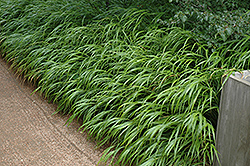Height: 24 inches
Spread: 24 inches
Sunlight:
![]()
![]()
Hardiness Zone: 4
Other Names: Hakone Grass
Description:
A moisture and shade loving ornamental grass that produces handsome mounds of arching slender leaves in green, golds or variegated patterns; easy to grow and low maintenance, perfect for borders, beds, containers or used as groundcover
Ornamental Features
Japanese Woodland Grass is primarily valued in the garden for its cascading habit of growth. It grassy leaves are green in color. The foliage often turns tan in fall.
Landscape Attributes
Japanese Woodland Grass is a dense herbaceous perennial grass with a shapely form and gracefully arching stems. Its relatively fine texture sets it apart from other garden plants with less refined foliage.
This is a relatively low maintenance plant, and usually looks its best without pruning, although it will tolerate pruning. It has no significant negative characteristics.
Japanese Woodland Grass is recommended for the following landscape applications;
- Mass Planting
- Border Edging
- General Garden Use
- Naturalizing And Woodland Gardens
- Container Planting
Planting & Growing
Japanese Woodland Grass will grow to be about 24 inches tall at maturity, with a spread of 24 inches. Its foliage tends to remain dense right to the ground, not requiring facer plants in front. It grows at a slow rate, and under ideal conditions can be expected to live for approximately 15 years. As an herbaceous perennial, this plant will usually die back to the crown each winter, and will regrow from the base each spring. Be careful not to disturb the crown in late winter when it may not be readily seen!
This plant does best in partial shade to shade. It requires an evenly moist well-drained soil for optimal growth, but will die in standing water. It is not particular as to soil type or pH. It is somewhat tolerant of urban pollution. This species is not originally from North America.
Japanese Woodland Grass is a fine choice for the garden, but it is also a good selection for planting in outdoor pots and containers. It can be used either as 'filler' or as a 'thriller' in the 'spiller-thriller-filler' container combination, depending on the height and form of the other plants used in the container planting. It is even sizeable enough that it can be grown alone in a suitable container. Note that when growing plants in outdoor containers and baskets, they may require more frequent waterings than they would in the yard or garden.
